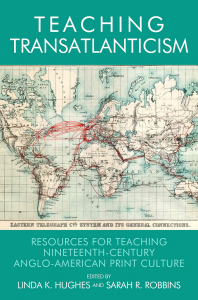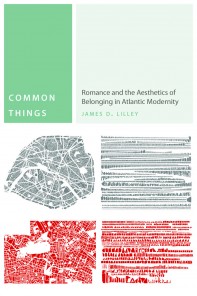 From Fordham University Press: What are the relationships between the books we read and the communities we share? Common Things explores how transatlantic romance revivals of the eighteenth and nineteenth century influenced—and were influenced by—emerging modern systems of community.Drawing on the work of Washington Irving, Henry Mackenzie, Thomas Jefferson, James Fenimore Cooper, Robert Montgomery Bird, and Charles Brockden Brown, the book shows how romance promotes a distinctive aesthetics of belonging—a mode of being in common tied to new qualities of the singular. Each chapter focuses on one of these common things—the stain of race, the “property” of personhood, ruined feelings, the genre of a text, and the event of history—and examines how these peculiar qualities work to sustain the coherence of our modern common places. In the work of Horace Walpole and Edgar Allan Poe, the book further uncovers an important— and never more timely—alternative aesthetic practice that reimagines community as an open and fugitive process rather than as a collection of common things.
From Fordham University Press: What are the relationships between the books we read and the communities we share? Common Things explores how transatlantic romance revivals of the eighteenth and nineteenth century influenced—and were influenced by—emerging modern systems of community.Drawing on the work of Washington Irving, Henry Mackenzie, Thomas Jefferson, James Fenimore Cooper, Robert Montgomery Bird, and Charles Brockden Brown, the book shows how romance promotes a distinctive aesthetics of belonging—a mode of being in common tied to new qualities of the singular. Each chapter focuses on one of these common things—the stain of race, the “property” of personhood, ruined feelings, the genre of a text, and the event of history—and examines how these peculiar qualities work to sustain the coherence of our modern common places. In the work of Horace Walpole and Edgar Allan Poe, the book further uncovers an important— and never more timely—alternative aesthetic practice that reimagines community as an open and fugitive process rather than as a collection of common things.
New Book: Tropics of Haiti Race and the Literary History of the Haitian Revolution in the Atlantic World, 1789-1865 by Marlene L. Daut
From Liverpool University Press: 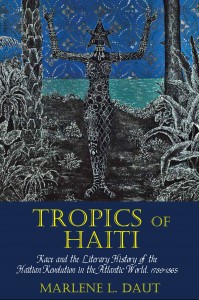 The Haitian Revolution (1791–1804) was an event of monumental world-historical significance, and here, in the first systematic literary history of those events, Haiti’s war of independence is examined through the eyes of its actual and imagined participants, observers, survivors, and cultural descendants. The ‘transatlantic print culture’ under discussion in this literary history reveals that enlightenment racial ‘science’ was the primary vehicle through which the Haitian Revolution was interpreted by nineteenth-century Haitians, Europeans, and U.S. Americans alike. Through its author’s contention that the Haitian revolutionary wars were incessantly racialized by four constantly recurring tropes—the ‘monstrous hybrid’, the ‘tropical temptress’, the ‘tragic mulatto/a’, and the ‘colored historian’—Tropics of Haiti shows the ways in which the nineteenth-century tendency to understand Haiti’s revolution in primarily racial terms has affected present day demonizations of Haiti and Haitians. In the end, this new archive of Haitian revolutionary writing, much of which has until now remained unknown to the contemporary reading public, invites us to examine how nineteenth-century attempts to paint Haitian independence as the result of a racial revolution coincide with present-day desires to render insignificant and ‘unthinkable’ the second independent republic of the New World.
The Haitian Revolution (1791–1804) was an event of monumental world-historical significance, and here, in the first systematic literary history of those events, Haiti’s war of independence is examined through the eyes of its actual and imagined participants, observers, survivors, and cultural descendants. The ‘transatlantic print culture’ under discussion in this literary history reveals that enlightenment racial ‘science’ was the primary vehicle through which the Haitian Revolution was interpreted by nineteenth-century Haitians, Europeans, and U.S. Americans alike. Through its author’s contention that the Haitian revolutionary wars were incessantly racialized by four constantly recurring tropes—the ‘monstrous hybrid’, the ‘tropical temptress’, the ‘tragic mulatto/a’, and the ‘colored historian’—Tropics of Haiti shows the ways in which the nineteenth-century tendency to understand Haiti’s revolution in primarily racial terms has affected present day demonizations of Haiti and Haitians. In the end, this new archive of Haitian revolutionary writing, much of which has until now remained unknown to the contemporary reading public, invites us to examine how nineteenth-century attempts to paint Haitian independence as the result of a racial revolution coincide with present-day desires to render insignificant and ‘unthinkable’ the second independent republic of the New World.
New Book: Transatlantic Romanticism by Andrew Hemingway and Alan Wallach, Eds.
From the University of Massachusetts Press: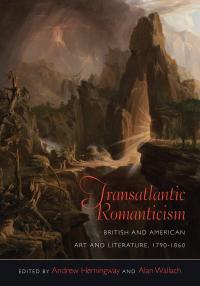 That the Romantic movement was an international phenomenon is a commonplace, yet to date, historical study of the movement has tended to focus primarily on its national manifestations. This volume offers a new perspective. In thirteen chapters devoted to artists and writers of the late eighteenth and early nineteenth centuries, leading scholars of the period examine the international exchanges that were crucial for the rise of Romanticism in England and the United States.
That the Romantic movement was an international phenomenon is a commonplace, yet to date, historical study of the movement has tended to focus primarily on its national manifestations. This volume offers a new perspective. In thirteen chapters devoted to artists and writers of the late eighteenth and early nineteenth centuries, leading scholars of the period examine the international exchanges that were crucial for the rise of Romanticism in England and the United States.
In the book’s introduction, Andrew Hemingway—building on the theoretical work of Michael Lowy and Robert Sayre—proposes that we need to remobilize the concept of Weltanschauung, or comprehensive worldview, in order to develop the kind of synthetic history of arts and ideas the phenomenon of Romanticism demands. The essays that follow focus on the London and New York art worlds and such key figures as Benjamin West, Thomas Bewick, John Vanderlyn, Washington Allston, John Martin, J. M. W. Turner, Thomas Cole, James Fenimore Cooper, George Catlin, Edgar Allan Poe, Harriet Beecher Stowe, and Herman Melville. Taken together, these essays plot the rise of a romantic anti-capitalist Weltanschauung as well as the dialectic between Romanticism’s national and international manifestations.
In addition to the volume editors, contributors include Matthew Beaumont, David Bindman, Leo Costello, Nicholas Grindle, Wayne Franklin, Janet Koenig, William Pressly, Robert Sayre, William Truettner, Dell Upton, and William Vaughan. – See more at: http://www.umass.edu/umpress/title/transatlantic-romanticism#sthash.ZBjrHmlo.dpuf
Preview of Teaching Transatlanticism
For a preview of the forthcoming Teaching Transatlanticism, please click here to read the Introductory chapter: “Tracing Currents and Joining Conversations.”
New Book: Hospitality and the Transatlantic Imagination, 1815-1835, by Cynthia Schoolar Williams
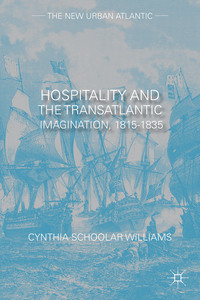 From Palgrave MacMillan: “At the exhausted conclusion of the Napoleonic Wars, as nationalisms gained momentum, writers as diverse as Mary Shelley, James Fenimore Cooper, Washington Irving, and Felicia Hemans took up the discourse of hospitality. In a series of innovative transatlantic texts, they posed urgent questions about displacement and the nation: How does one claim to belong? What are the limits of welcome?Hospitality and the Transatlantic Imagination, 1815-1835 argues that this select group of late-Romantic English and American writers disrupted national tropes by reclaiming their countries’ shared historical identification with hospitality. In doing so, they reimagined the spaces of encounter: the city, the young republic, the coast of England, and the Atlantic itself.”
From Palgrave MacMillan: “At the exhausted conclusion of the Napoleonic Wars, as nationalisms gained momentum, writers as diverse as Mary Shelley, James Fenimore Cooper, Washington Irving, and Felicia Hemans took up the discourse of hospitality. In a series of innovative transatlantic texts, they posed urgent questions about displacement and the nation: How does one claim to belong? What are the limits of welcome?Hospitality and the Transatlantic Imagination, 1815-1835 argues that this select group of late-Romantic English and American writers disrupted national tropes by reclaiming their countries’ shared historical identification with hospitality. In doing so, they reimagined the spaces of encounter: the city, the young republic, the coast of England, and the Atlantic itself.”
New Book: New World Drama: The Performative Commons in the Atlantic World, 1649-1849 by Elizabeth Maddock Dillon
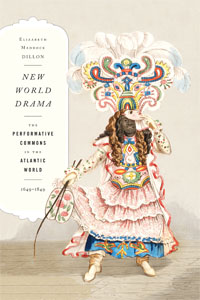 From Duke University Press: “In New World Drama, Elizabeth Maddock Dillon turns to the riotous scene of theatre in the eighteenth-century Atlantic world to explore the creation of new publics. Moving from England to the Caribbean to the early United States, she traces the theatrical emergence of a collective body in the colonized New World—one that included indigenous peoples, diasporic Africans, and diasporic Europeans. In the raucous space of the theatre, the contradictions of colonialism loomed large. Foremost among these was the central paradox of modernity: the coexistence of a massive slave economy and a nascent politics of freedom.
From Duke University Press: “In New World Drama, Elizabeth Maddock Dillon turns to the riotous scene of theatre in the eighteenth-century Atlantic world to explore the creation of new publics. Moving from England to the Caribbean to the early United States, she traces the theatrical emergence of a collective body in the colonized New World—one that included indigenous peoples, diasporic Africans, and diasporic Europeans. In the raucous space of the theatre, the contradictions of colonialism loomed large. Foremost among these was the central paradox of modernity: the coexistence of a massive slave economy and a nascent politics of freedom.
Audiences in London eagerly watched the royal slave, Oroonoko, tortured on stage, while audiences in Charleston and Kingston were forbidden from watching the same scene. Audiences in Kingston and New York City exuberantly participated in the slaying of Richard III on stage, enacting the rise of the “people,” and Native American leaders were enjoined to watch actors in blackface “jump Jim Crow.” Dillon argues that the theater served as a “performative commons,” staging debates over representation in a political world based on popular sovereignty. Her book is a capacious account of performance, aesthetics, and modernity in the eighteenth-century Atlantic world.”
New Book: Emily Dickinson’s Rich Conversation by Richard E. Brantley

From The publisher, “Emily Dickinson’s Rich Conversation explores the function of hope in Dickinson’s poems and looks to place her in a broad cultural context. Brantley teases out the implications of a succinct central perception by treating that perception as a pebble tossed into the pool of late-19th-century transatlantic culture. His departure from familiar stylistics and his challenging yet entertaining mode of analysis make for delightful reading.” – Paul Crumbley, Professor of English and Director of the Undergraduate American Studies Program, Utah State University, USA
News: Book cover design for forthcoming edition of Teaching Transatlanticism released!
New Book: Literature and Music in the Atlantic World, 1767-1867 by Catherine Jones
 From Amazon.com: “This new study looks at the relationship of rhetoric and music in the era’s intellectual discourses, texts and performance cultures principally in Europe and North America. Catherine Jones begins by examining the attitudes to music and its performance by leading figures of the American Enlightenment and Revolution, notably Benjamin Franklin and Thomas Jefferson. She also looks at the attempts of Francis Hopkinson, William Billings and others to harness the Orphean power of music so that it should become a progressive force in the creation of a new society. She argues that the association of rhetoric and music that reaches back to classical Antiquity acquired new relevance and underwent new theorisation and practical application in the American Enlightenment in light of revolutionary Atlantic conditions. Jones goes on to consider changes in the relationship of rhetoric and music in the nationalising milieu of the nineteenth century; the connections of literature, music and music theory to changing models of subjectivity; and Romantic appropriations of Enlightenment visions of the public ethical function of music.”
From Amazon.com: “This new study looks at the relationship of rhetoric and music in the era’s intellectual discourses, texts and performance cultures principally in Europe and North America. Catherine Jones begins by examining the attitudes to music and its performance by leading figures of the American Enlightenment and Revolution, notably Benjamin Franklin and Thomas Jefferson. She also looks at the attempts of Francis Hopkinson, William Billings and others to harness the Orphean power of music so that it should become a progressive force in the creation of a new society. She argues that the association of rhetoric and music that reaches back to classical Antiquity acquired new relevance and underwent new theorisation and practical application in the American Enlightenment in light of revolutionary Atlantic conditions. Jones goes on to consider changes in the relationship of rhetoric and music in the nationalising milieu of the nineteenth century; the connections of literature, music and music theory to changing models of subjectivity; and Romantic appropriations of Enlightenment visions of the public ethical function of music.”
New Book: The Poetics and Politics of Diaspora: Transatlantic Musings by Jerome C. Branche
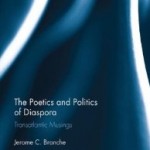 From Amazon.com:“This book studies the creative discourse of the modern African diaspora by analyzing poems, novels, essays, hip-hop and dub poetry in the Caribbean, England, Spain, and Colombia, and capturing diasporan movement through mutually intersecting axes of dislocation and relocation, and efforts at political group affirmation and settlement, or “location.” Branche’s study connects London’s multimillion-dollar riots of 2011, and its antecedents associated with the West Indian settler community, to the discontent and harrowing conditions facing black immigrants to contemporary Spain as gateway to Fortress Europe. It links the brutal massacres that target Colombia’s dispossessed and displaced poor – and mainly black – “throwaway” citizens, victims of the drug trade and neoliberal expansionism, to older Caribbean stories that tell of the original spurts of capitalist greed, and the colonial cauldron it created, at the center of which lay the slave trade. In revisiting the question of what really has awaited Afro-descendants at the end of the Middle Passage, this volume brings transatlantic slavery, the making of weak postcolonial states that bleed people, and the needle’s eye of racial identification together through a close reading of rappers, black radicals, dub poetry, and novelists from Europe, Africa, and the Americas. Branche at once demonstrates the existence of an archive of Afro-modern diasporan, discursive production, and just as importantly, points toward a historically-rooted theoretical framework that would contain its liberatory trajectory.”
From Amazon.com:“This book studies the creative discourse of the modern African diaspora by analyzing poems, novels, essays, hip-hop and dub poetry in the Caribbean, England, Spain, and Colombia, and capturing diasporan movement through mutually intersecting axes of dislocation and relocation, and efforts at political group affirmation and settlement, or “location.” Branche’s study connects London’s multimillion-dollar riots of 2011, and its antecedents associated with the West Indian settler community, to the discontent and harrowing conditions facing black immigrants to contemporary Spain as gateway to Fortress Europe. It links the brutal massacres that target Colombia’s dispossessed and displaced poor – and mainly black – “throwaway” citizens, victims of the drug trade and neoliberal expansionism, to older Caribbean stories that tell of the original spurts of capitalist greed, and the colonial cauldron it created, at the center of which lay the slave trade. In revisiting the question of what really has awaited Afro-descendants at the end of the Middle Passage, this volume brings transatlantic slavery, the making of weak postcolonial states that bleed people, and the needle’s eye of racial identification together through a close reading of rappers, black radicals, dub poetry, and novelists from Europe, Africa, and the Americas. Branche at once demonstrates the existence of an archive of Afro-modern diasporan, discursive production, and just as importantly, points toward a historically-rooted theoretical framework that would contain its liberatory trajectory.”

